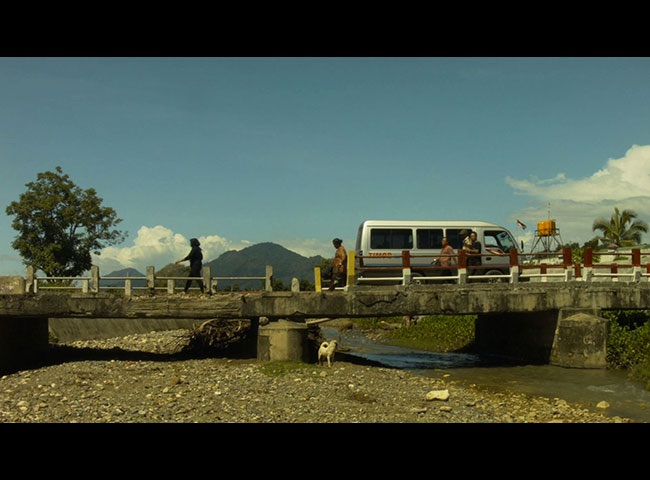Gyeong-Gye
-
Réalisé par Daniel Rudi Haryanto, Mun Jeong-Hyun, Vladimir Todorović • Écrit par Daniel Rudi Haryanto, Mun Jeong-Hyun, Vladimir Todorović
-
Indonésie, Singapour, Corée du Sud • 2014 • 87 minutes • HDCam • Couleur
- Réalisation :
Daniel Rudi Haryanto, Mun Jeong-Hyun, Vladimir Todorović - Écriture :
Daniel Rudi Haryanto, Mun Jeong-Hyun, Vladimir Todorović - Image :
Sejin Kang, Imho Shin, Vladimir Todorović, Erik Wirasakti - Son :
Soohyun Kim - Montage :
Dimas Adrain, Dedih Nur Fajar Paksi, Hobin Sun, Vladimir Todorović
- Production (structure) :
Purn Production - Coproduction :
Tadar Studio, Daniel Rudi Haryanto Film - Ayant droit :
Purn Production
- N° ISAN :
non renseigné
Résumé
"Dans ce road movie épistolaire, les sentiers bifurquent, et pour cause : trois réalisateurs de nationalité différente y campent sur des frontières mouvantes, fourchues. Tout commence avec une frontière intérieure : celle du résident étranger, dont le vertige de retrouver au supermarché local son plat préféré "de chez lui" est somme toute très doux. Et celle, symétrique, du visiteur indonésien (Rudi Haryanto) qui voit en Tokyo "un cinéma géant". Mais le découpage de Gyeong-Gye progresse vers des sensations moins rêveuses : fossé entre le rêve des ouvriers étrangers et leur vie à Singapour, liquidation d’un quartier de Cape Town qu’une famille immigrée vit comme un déracinement... Bientôt l’altérité sur un territoire prend la forme de la ruine où seul un récit peut réinsuffler de l’Histoire, comme sur l’île indonésienne où 250 000 Vietnamiens furent recueillis il y a 40 ans. Le découpage du film intériorise la frontière, et la rend plus dolente. L’oncle de Mun Jeonghyn, résident japonais coupé de sa famille nord et sud-coréenne depuis 65 ans, incarne à lui seul l’arbitraire de la frontière. Sans doute le bateau de l’ami de Vladimir Todorovic, construit avec des panneaux routiers, pourrait aider à se repérer dans le monde ainsi taillé sans attention pour les liens humains... Mais la crise a eu raison de ce véhicule composite. Voguer à son gré, pouvoir se repérer : ce qui devrait être le simple de l’homme n’a jamais été aussi entravé que depuis que la technologie l’a rendu possible."
(Charlotte Garson - Cinéma du réel)
"In this epistolary road movie, two paths diverge, and for good reason: three film- makers with different nationalities visit shifting borders. It all begins with inner frontiers: that of the foreign resident whose stupefaction on find- ing his favourite dish from “back home” in the local supermarket is actually very clement. This is matched by the awe of the Indonesian visitor (Rudi Haryanto), who sees Tokyo as “a giant cinema”. However, the cuts in Fluid Boundaries advance towards less enraptured sentiments: the gulf between the foreign workers’ dreams and their life in Singapore, the destruction of a Cape Town neighbourhood that is experienced as an uprooting by an immigrant family... Before long, “otherness” on a territory materialises as a ruin where narrative alone can bring History back to life, as on the Indonesian island that took in 250,000 Vietnamese 40 years before. The cuts interiorise bor- ders, making them more doleful. Mun Jeonghyn’s uncle, a Japanese resident, separated from his North and South Korean family for 65 years, epitomises all by him-self the capriciousness of borders. Doubtless, the boat of Vladimir Todorovic’s friend, built out of road signs, could help to give bearings in a world shaped with no concern for human ties... But the crisis has got the better of this composite vessel. Sailing at will, finding one’s bearings: what should be humanly simple has never been so difficult since technology made everything possible."
(Charlotte Garson - Cinéma du réel)
Mot(s)-clé(s) thématique(s)
Sélections et distinctions
- 2015 • Cinéma du réel • Paris (France) • Compétition Internationale - Premiers Films
Comment avoir accès au film ?
-
Édition DVD
- Il n'existe pas d'édition DVD à notre connaissance
-
Accès VOD
- Il n'existe pas d'accès en VOD à notre connaissance
- Distribution
- Aide sur les moyens d'accéder à un film
